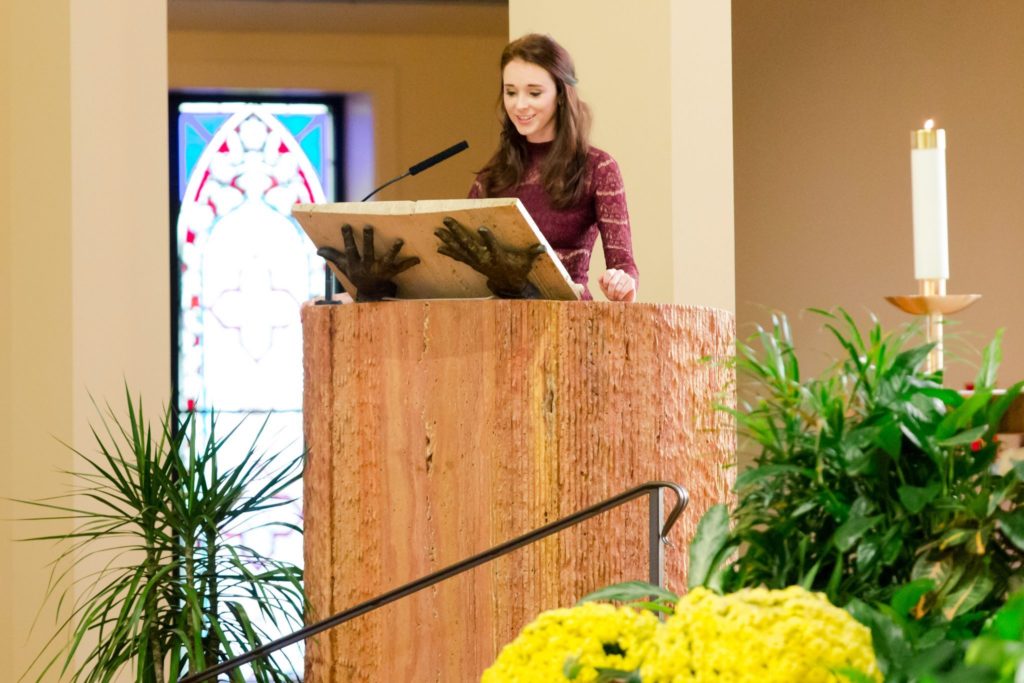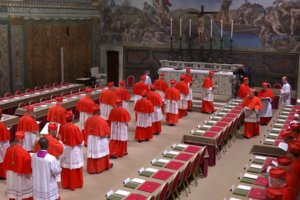VATICAN: Pope Francis Modifies a Section of Canon Law to Allow Women to Ministries of Lector and Acolyte

Women allowed to be Lectors and Acolytes
Sr. Jecinter Antoinette Okoth, FSSA
Pope Francis has in his Apostolic letter “Spiritus Domini” modified a section of Canon Law which permitted only men to serve as lectors and acolytes in the Church to now include women.
The new ministries permit women to proclaim the Word of God during liturgical celebrations and assist at the altar.
“Lay persons of suitable age and with the gifts determined by decree of the Episcopal Conference may be permanently assigned, by means of the established liturgical rite, to the ministries of lector and acolyte. However, the conferment of such a role does not entitle them to support or remuneration from the Church,” reads the modified canon 230 §1 in the document issued on Monday, January 11.
Prior to the change, the Canon specified the role of lectors and acolytes to “lay men” which the Pontiff has changed to “lay persons.”
According to the Pope, the adjustment of the Canon came about after “A number of Assemblies of the Synod of Bishops highlighted the need to deepen the subject doctrinally, so that it may respond to the nature of the afore-mentioned charisms and the needs of the times, offering appropriate support to the role of evangelization that is incumbent upon the ecclesial community.”
He noted that after the Assemblies of the Synod of bishops accepted the recommendations, “a doctrinal development highlighted how certain ministries instituted by the Church are based on the common condition of being baptised and the regal priesthood received in the Sacrament of Baptism.”
Besides, a consolidated practice in the Latin Church has also confirmed, “that these lay ministries, since they are based on the Sacrament of Baptism, may be entrusted to all suitable faithful, whether male or female.”
In a letter addressed to the Prefect of the Congregation for the Doctrine of the Faith Cardinal Luis F. Ladaria, Pope Francis explains the decision for allowing women to serve as lectors and acolytes.
“Within the spectrum of renewal traced out by the Second Vatican Council, the urgency is being ever more felt today to rediscover the co-responsibility of all of the baptized in the Church, and the mission of the laity in a particular way,” the Holy Father observes.
He adds in reference to the final document of the Synod for the Pan-Amazon Region, “Regarding the entire Church, in the variety of situations, it is urgent that ministries for men and women be promoted and conferred… It is the Church made up of baptized men and women that we must consolidate, promoting forms of ministry and, above all, an awareness of baptismal dignity.”
“For these reasons, I thought it opportune to establish that they can be instituted as Readers or Acolytes not only men but also women, in which, through the discernment of pastors and after adequate preparation, the Church recognizes “the firm will to serve faithfully God and the Christian people,” he explains.
He continues, “The choice of conferring these offices on women too, which entail stability, public recognition and mandate from the bishop, makes the participation of all in the work of evangelization more effective in the Church. This also ensures that women have a real and effective impact in the organization, in the most important decisions and in the leadership of communities but without stopping to do so with the style of their feminine imprint.”
The Pontiff clarified further that “The “baptismal priesthood” and “community service” represent the two pillars on which the institution of ministries is founded.
The Episcopal Conferences have the responsibility “to establish adequate criteria for the discernment and preparation of candidates for the ministries of Lector or Acolyte, or of other ministries that they deem to establish,” reads in part the Monday letter to the Cardinal Prefect of the Congregation for the Doctrine of the Faith.
Consequently, the Congregation for Divine Worship and the Discipline of the Sacraments would be responsible for guiding the changes, amending parts of the Roman Missal and the rite of institution of lectors and acolytes where necessary.


